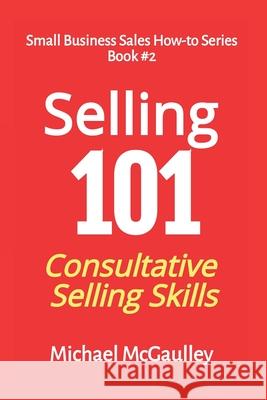Selling 101: Consultative Selling Skills: For new entrepreneurs, free agents, consultants » książka
Selling 101: Consultative Selling Skills: For new entrepreneurs, free agents, consultants
ISBN-13: 9780976840664 / Angielski / Miękka / 2013 / 242 str.
Selling 101: Consultative Selling Skills: For new entrepreneurs, free agents, consultants
ISBN-13: 9780976840664 / Angielski / Miękka / 2013 / 242 str.
(netto: 49,22 VAT: 5%)
Najniższa cena z 30 dni: 51,54
ok. 16-18 dni roboczych
Dostawa w 2026 r.
Darmowa dostawa!
This third Edition of SELLING 101 is drawn from the selling skills training courses and sales how-to books the author developed for top marketing organizations. It is intended for sales people with some experience. Ideal for sales meetings and continuing OJT. SELLING 101 is a sales book designed to provide practical sales how-to guidance on the kind of consultative sales and selling skills useful to both beginners and experienced sales people looking for fresh ideas and the kind of selling skills how-to training provided in the sales universities of top sales and marketing organizations. Selling face to face is a main focus of this sales book, as is using a consultative sales approach. SELLING 101 also provides the practical sales how-to guidance needed as more and more people are setting up new businesses, or shifting to self-employment as consultants, free agents, free lancers, and new entrepreneurs. Among the topics covered in this sales book: Sales prospecting for locating viable prospects. Getting past gatekeepers and screens. Using the phone to intrigue prospects into granting appointments. Making face to face sales calls. Using a consultative selling approach to build the prospect's awareness of needs, then make the case for how the product or service will best fill those needs. Handling objections and questions. Closing the sale. Following up after the sale. PART ONE: LOCATING PRIORITY PROSPECTS 1. Creating Your Prospect List - Checklist to trigger thinking - Summary/action plan 2. Setting Priorities Among Prospects - How to fail: spread yourself too thin - Criteria in setting priorities among potential prospects PART TWO: LOCATING AND GETTING THROUGH TO THE APPROPRIATE DECISION MAKER 3. Finding the Person or Team Who Can Say Yes - The AND Test - Finding your way to the decision maker with true buying power - If you can't locate a decision maker with true buying power - Decision influencers and how to work with them - When to begin with the purchasing manager, and when not to - Training directors: when to begin there, and when not to 4. Getting Past the Decision Maker's Screen - Whether to "cold call" or work by appointment - Techniques for getting through (or around) the screen - Recognizing the screen's "buying signals" - When you encounter voice mail 5. Cold Calling -- When You Must - Cold calling as a research method - The kinds of information you are looking for in cold calling - Some how-to's - Sample script - If building security prevents sweeps 6. Convincing the Decision Maker to Meet With You - "Call up, fix up, hang up" - Useful hot buttons in this first phone contact - If the decision maker asks for more detail - Setting a time for the meeting - Closing the call - If you are not sure about this firm or decision maker 7. Organizing and Learning from Your Phone Calls - Checklist for critiquing your phone technique PART THREE: HELPING THE DECISION MAKER RECOGNIZE THE NEED FOR YOUR PRODUCT 8. Opening the Face-to-Face Meeting With the Decision Maker - Picking up clues when you're in the outer office - Using business cards, brochures, and other sales aids - Your opening: echo the hot button that worked on the phone - Being prepared for possible last-minute hesitations - The pros and cons of using icebreakers 9. Developing/Enhancing the Decision Maker's Awareness of Need - Asking the right questions: The Consultative Selling Wedge 10. Selling by Asking Questions: The Consultative Selling Wedge - A second look at the question types - Model wedge dialog - Cycling back to develop additional needs 11. Matching the Question to the Situation - Why NOT to ask about "problems" - Other ways the questions help your marketing - Question types and their uses - Sample questions of each type 12. Selling by Asking Questions: the Questions in Action - Opening statement/overview questions - Cycling through the three question groups THIS IS A SAMPLE OF PARTIAL CONTENTS.THE ACTUAL BOOK CONTAINS 25 CHA











